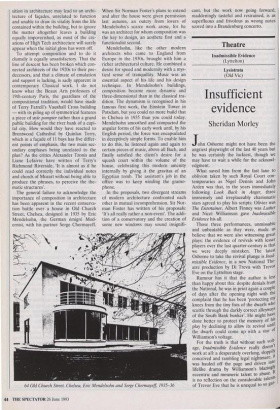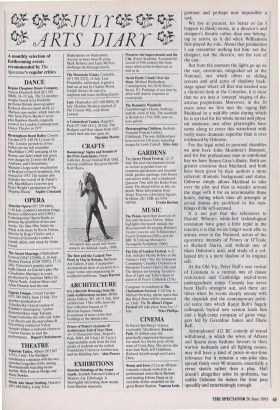Theatre
Inadmissible Evidence (Lyttelton) Lysistrata (Old Vic)
Insufficient evidence
Sheridan Morley John Osborne might not have been the angriest playwright of the last 40 years but he was certainly the luckiest, though we may have to wait a while for the acknowl- edgment.
What saved him from the fast lane to oblivion taken by such Royal Court con- temporaries as Nigel Dennis and John Arden was that, in the years immediately following Look Back in Anger, three immensely and irreplaceably charismatic stars agreed to play his scripts: Olivier was The Entertainer, Albert Finney was Luther and Nicol Williamson gave Inadmissible Evidence his all.
Those three performances, unmissable and unbeatable as they were, made us believe that we were also witnessing great plays: the evidence of revivals with lesser players over the last quarter-century is that we were deeply mistaken. The latest Osborne to take the revival plunge is Inad- missible Evidence, in a new National The- atre production by Di Trevis with Trevor Eve on the Lyttelton stage.
Rumour has it that the author is less than happy about this: despite denials from the National, he was in print again a couple of days after the opening night with the complaint that he has been 'protecting mY knees from the tiny fists of the dwarfs who scuttle through the darkly correct alleyways of the South Bank bunker'. He might have done better to protect the memory of his play by declining to allow its revival until the dwarfs could come up with a star of Williamson's voltage.
For the truth is that without such volt- age, Inadmissible Evidence really doesn't work at all: a desperately overlong, slopPil.Y conceived and rambling legal nightmare, It was hauled off the page and driven into lifelike drama by Williamson's blazingly eccentric and mesmeric talent to abuse. It is no reflection on the considerable talents of Trevor Eve that he is unequal to so gar"
gantuan and perhaps now impossible a task.
We live at present, for better or (as I happen to think) worse, in a director's and designer's theatre rather than one belong- ing to actors, as it did when Williamson first played the role. About that production I can remember nothing but him: not the designer, not the director, not the rest of the cast.
But from the moment the lights go up on the vast, cavernous, misguided set at the National, one which offers us sliding screens and arid acres of shadowy back- stage space where all that was needed was a cluttered desk at the Cottesloe, it is clear that we are into a 'concept' staging of dis- astrous proportions. Moreover, in the 30 years since we first met the raging Bill Maitland in a mid-life crisis during which he is on trial for his whole moral and physi- cal existence, two other playwrights have come along to cover this waterfront with vastly more dramatic expertise than is ever evidenced by Osborne.
For the legal mind in personal shambles we now have John Mortimer's Rumpole, and for the professional man at emotional bay we have Simon Gray's Butley. Both are greater creations than Maitland, and both have been given by their authors a more coherent dramatic background and status. Osborne simply allows Maitland to take over the play and then to wander around the stage with it for an interminable three hours, during which time all attempts at actual drama are sacrificed to the ram- blings of the self-accused.
It is not just that the references to Harold Wilson's white-hot technological revolution have gone a little tepid in the interim: it is that we no longer seem able to attract, even to the National, actors of the egocentric intensity of Finney or O'Toole or Richard Harris, and without one of them Osborne's acid, arid study of a col- lapsed life is a mere shadow of its original self.
At the Old Vic, Peter Hall's rare revival of Lysistrata is a curious mix of classic restoration and Cambridge end-of-term undergraduate romp. Comedy has never been Hall's strongest suit, and there are times when he seems deeply uneasy with the slapstick and the contemporary politi- cal satire into which Ranjit Bolt's hugely colloquial, topical new version leads him and a high-camp company of game mug- gers led by Geraldine James and Diane Bull.
Aristophanes' 412 BC comedy of sexual withdrawal, in which the wives of Athens and Sparta deny bedtime favours to their warrior husbands until all fighting ceases, may still have a kind of peace-in-our-time relevance but it remains a one-joke idea spread thinly over 90 minutes, essentially a revue sketch rather than a play. Hall doesn't altogether solve its problems, but unlike Osborne he makes the time pass speedily and entertainingly enough.



























































 Previous page
Previous page